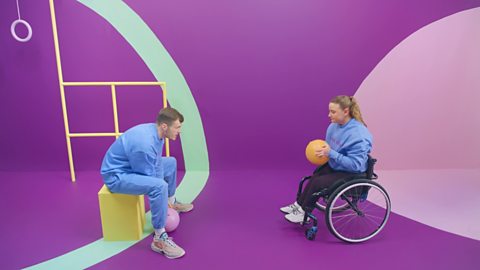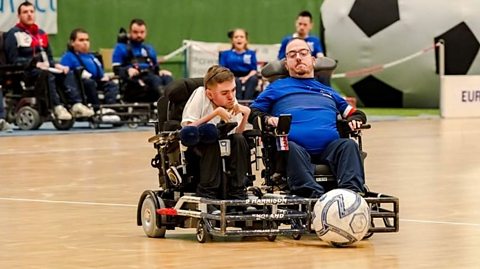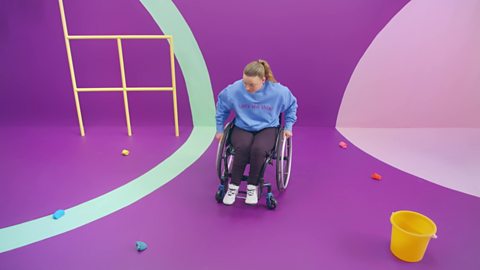With the countdown to the highly anticipated Rugby League World Cup 2021 well underway, it’s an exciting time to get involved with the sport’s premier international competition.
This year’s event is particularly notable as, for the first time, the Wheelchair Rugby League competition will be part of the tournament’s main event. BBC Bitesize visited London’s Copper Box Arena to speak to this year’s players and mark 100 days until the wheelchair tournament takes place on 3 November 2022.
To celebrate we’ve rounded up four things you need to know about Wheelchair Rugby League.

Ross: With the countdown to the Rugby League World Cup well underway, there has never been a better time to get involved with the sport. And this year's event is extra special because for the first time ever, the Men's, Women's and Wheelchair games will take place as part of the same tournament. But what is wheelchair rugby league all about? Let's find out.
Ross: Each game is made up of two forty minute halves and played on a 46 metre by 20 metre court. It's a five-a-side game with elements of tag, but much like the running game, each team is allowed six tackles before handing over the ball. Every player must always wear two tags on their shoulders and a tackle occurs when one or both tags are removed by a defender. A try, worth four points, is scored by grounding the ball across the line, whereas a kick at goal is worth two points. And that's achieved by punching the ball over the posts using the fist.
Adam: What I've learnt about wheelchair rugby league is that it's the same as every other form of rugby league. It's a passing game. It's about agility. It's about finding gaps. It's the same tactics, but it just sounds better.
Ross: Wheelchair rugby league is incredibly inclusive, with each team made up of three physically disabled and two non-disabled players. As a mixed team sport these players can be men, women, non-binary or transgender.
Jodie: It's one of the most inclusive sports on this planet I'd say.
Tom: We've got players that are brothers and sisters, fathers and sons, mother and daughters, all playing in the same team. I don't think you can find that anywhere else. No matter what gender you are, what age, what ethnicity you are or anything.
Jodie: Those of us who use a wheelchair outside of the sport probably have a tiny bit more of an advantage because we're used to it. But once everybody is strapped in their chairs, it all comes down to the work you put in and how much you enjoy playing it.
Ross: With a 100% winning record across two Wheelchair World Cups, France are the ones to watch this year. Their arch rivals are England, ranked second in the world. The two teams have had many close matches, including a World Cup Final, which saw a late converted try give France a 38-34 win over England in front of a home French crowd. Wheelchair rugby league has gone from strength to strength in the UK over the last few years and it's grown internationally too, with the addition of the USA competing in the World Cup for the first time. The energy and the passion of the rugby league players and supporters is evident.
Adam: This is enormous. The weird thing about rugby league in England for me is that it is seen as kind of the underdog sport and this year it's going to get the attention that it deserves. People will get behind it because it's a World Cup, regardless of what the sport is, they're going to be brought to the sport and they're going to walk away kind of falling in love with the sport I think.
Ross: Well there's not long to go and we'll be there to support all of our home nations. Will you?

You might end up falling in love with the sport
“I think if I could sum up Wheelchair Rugby League in a sentence it would be harder than you think it’s going to be,” comedian and Rugby League World Cup 2021 ambassador, Adam Hills, told BBC Bitesize. “People are going to be brought to the sport and they’re going to walk away falling in love with the sport.”
But how does it actually work? Wheelchair Rugby League is an adaptation of the running game, with many of the same rules. The key difference is that it aims to include any participants who are physically disabled or non-disabled to take part in a welcoming and inclusive environment.
Each game is made up of two 40-minute halves and generally played on a 46m x 20m court. It’s a five-a-side game with elements of tag, but much like the running version of rugby, each team is allowed six tackles before handing the ball over. Every player must always wear two tags on their shoulders and a tackles occurs when one (or both!) tags are removed by a defender.
A try, worth four points, is scored by placing the ball on the ground beyond the goal line, while a kick at goal, worth two points, is achieved by punching the ball over the posts using the fist.

It's a history-making tournament
In 2022, for the first time, the wheelchair competition will be part of the Rugby League World Cup main event. While the first ever wheelchair Rugby League World Cup was held across venues in Australia in 2008, this year will be the first time the wheelchair tournament is played concurrently with the men’s and women’s running matches.
The tournament, which was postponed in 2021 due to COVID-19, will see teams from Australia, England, France, Wales, Ireland, Scotland, Spain and USA battle it out for the title.
The wheelchair group stages will start on 3 November, beginning with an opening clash between England and Australia. The top four teams will then progress to the semi-finals, before the final is played at Manchester Central on 18 November.
England’s captain, Tom Halliwell, hopes the event will inspire future wheelchair Rugby League players; “I think we’re creating a legacy and that’s the biggest thing for us as players. To create that legacy for the next generation.”
Inclusivity is at the heart of the game
Anyone and everyone is welcome at Wheelchair Rugby League. “I think the biggest surprise about Wheelchair Rugby League is how inclusive it is”, Toby Burton-Carter, Ireland’s Vice Captain told us. “You don’t have to have a disability to play, it’s able-bodied as well. One of the biggest things is that we play mixed, it’s not just an all male or all female sport”.
Jodie Boyd-Ward, who will be representing Wales, described the sport as one of the most inclusive on this planet. “People are going to be able to watch men’s games, women’s games and wheelchair games on the BBC, so it’s open and accessible to everybody”.
She added; “If it’s a Sunday night and you want something to watch while you do your homework, it’s definitely worth watching it and this game is only going to keep on growing.”

The sport has changed people's lives
Wheelchair Rugby League has gone from strength to strength in the UK over the years and is growing internationally, with the addition of the USA competing in the World Cup competition for the first time.
Toby’s passion for the game began when a friend invited him to play just after lockdown. “It’s picked me up to the point where I’m managing a lot better, I’m doing a lot more, I’m volunteering in the community. The impact for me is unbelievable.”
“For me to represent my country in any sporting achievement is brilliant, but to put on the green jersey for Ireland and represent a whole nation is mind blowing. It’s something I’ve always wanted to do and I struggle to put into words just how proud I am to be able to do that, especially for all my family as well.”
England’s Tom agrees, “It’s taken me places I’ve never dreamed of. I’ve done things I’ve never dreamed of doing. I’ve met people and players I probably wouldn’t have met before. It’s amazing. I’m forever in debt to the sport.”
This article was published July 2022
Let's do this! Double Whammy
Get active with help from wheelchair rugby athlete, Gemma Lumsdaine, and primary PE teacher, Danny Denholm.

Football for all: Three disability football stars on what playing means to them
Three England stars with different disabilities give us an insight into different types of football and how the game has had an impact on them.

Let's do this! Scatter
Play Scatter with wheelchair rugby athlete, Gemma Lumsdaine, and primary PE teacher, Danny Denholm.
